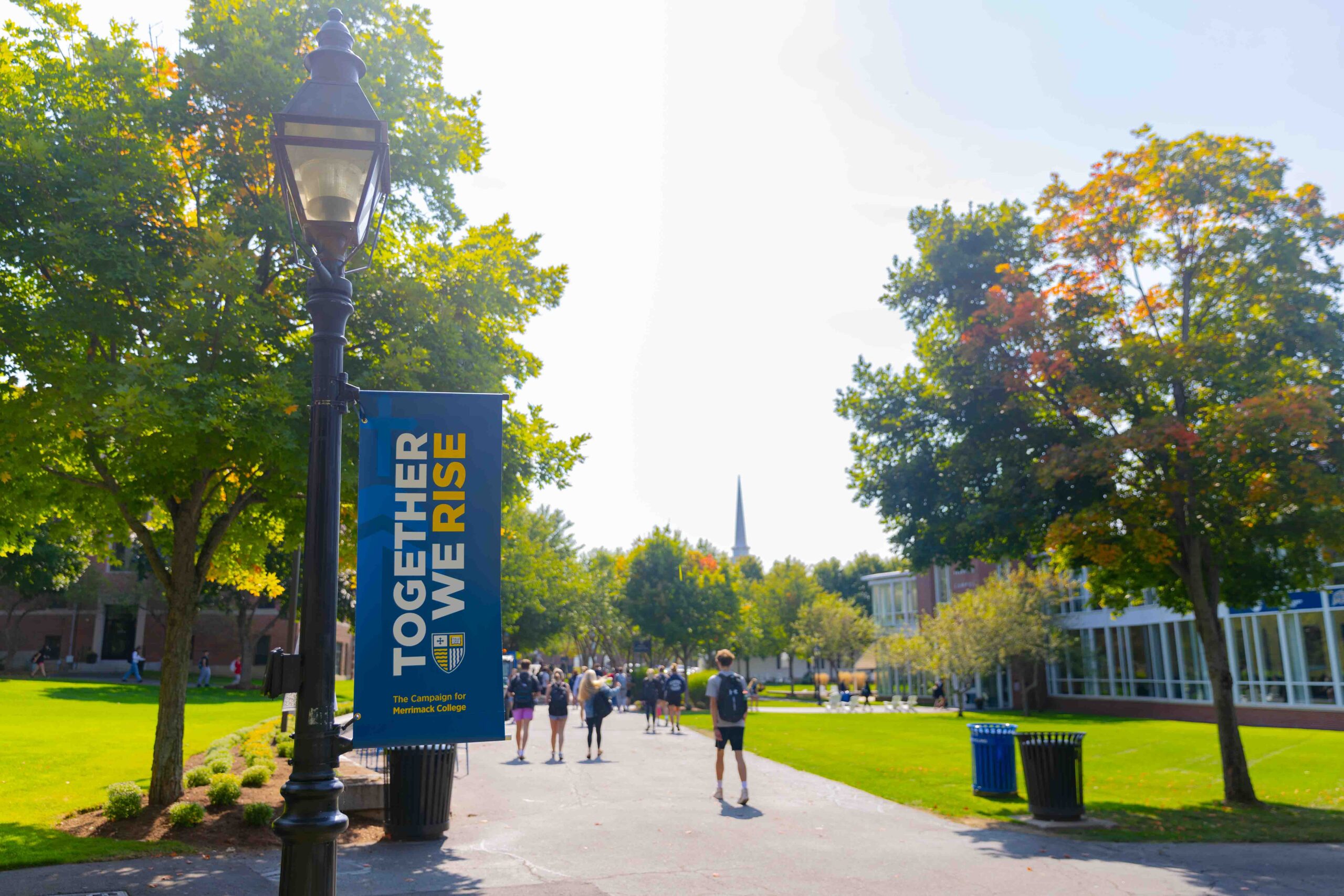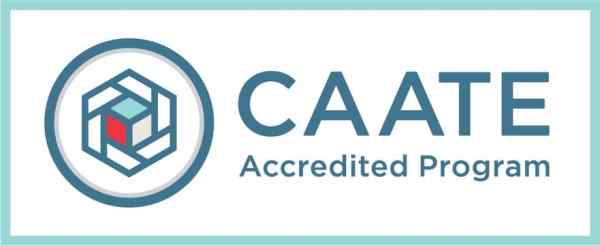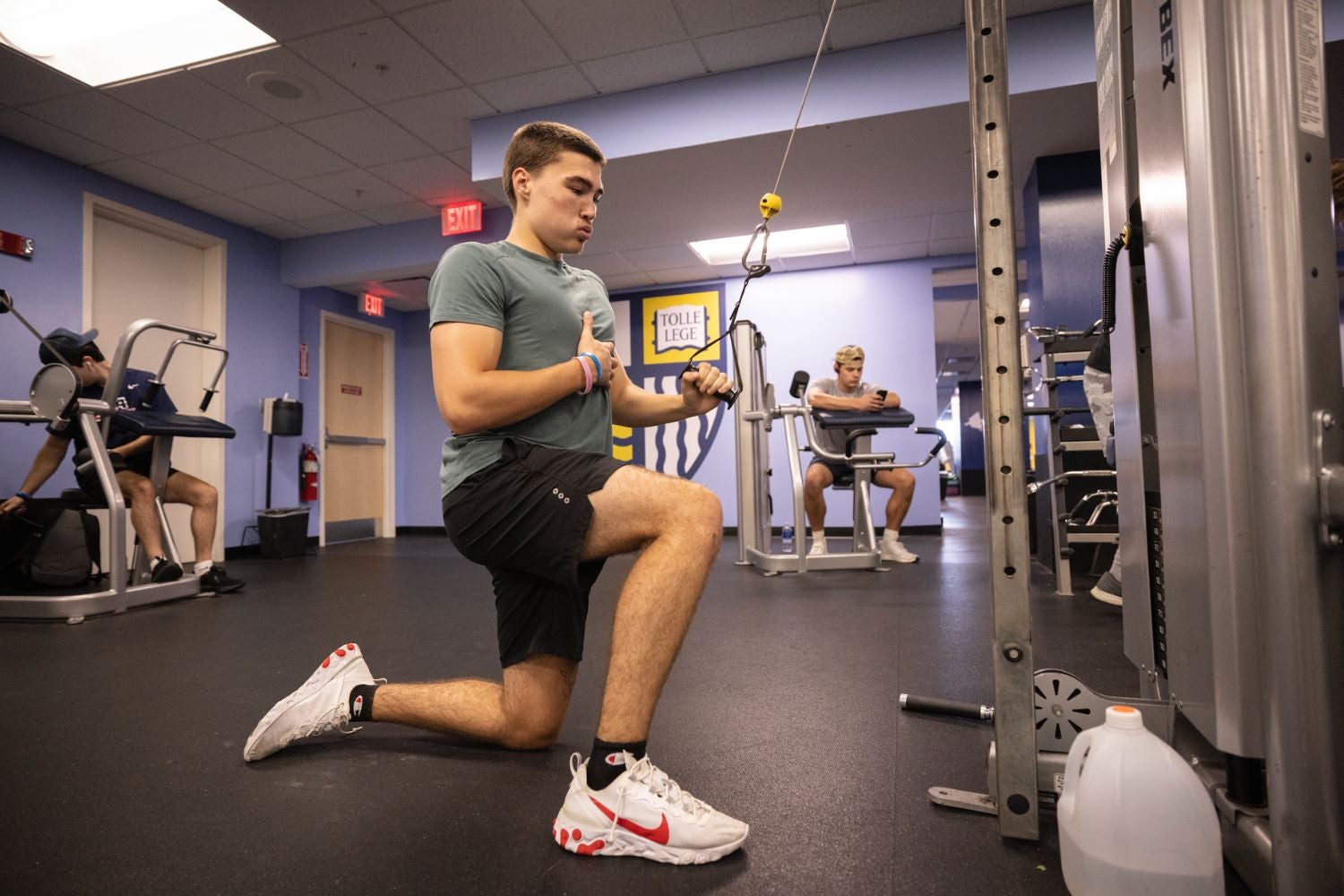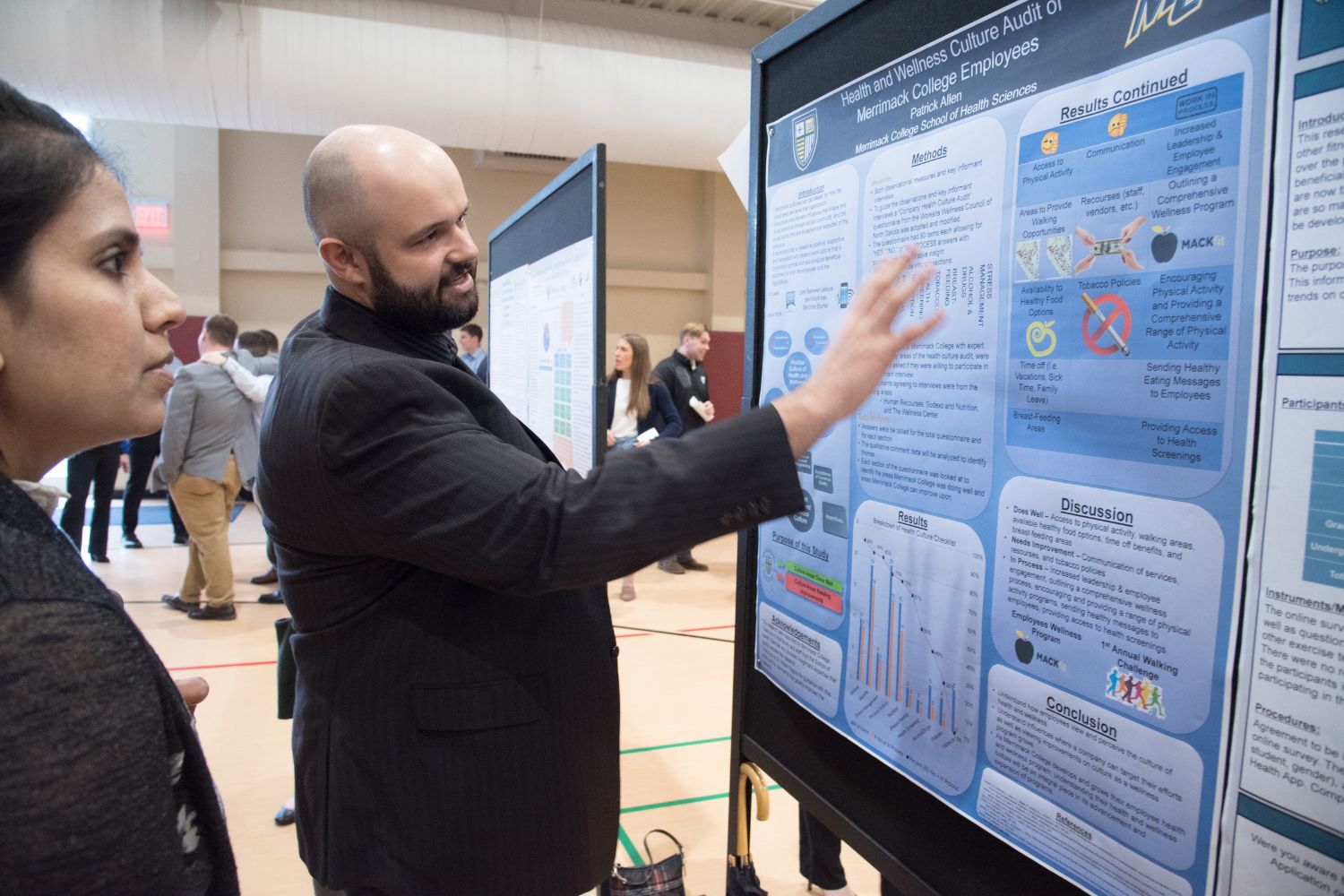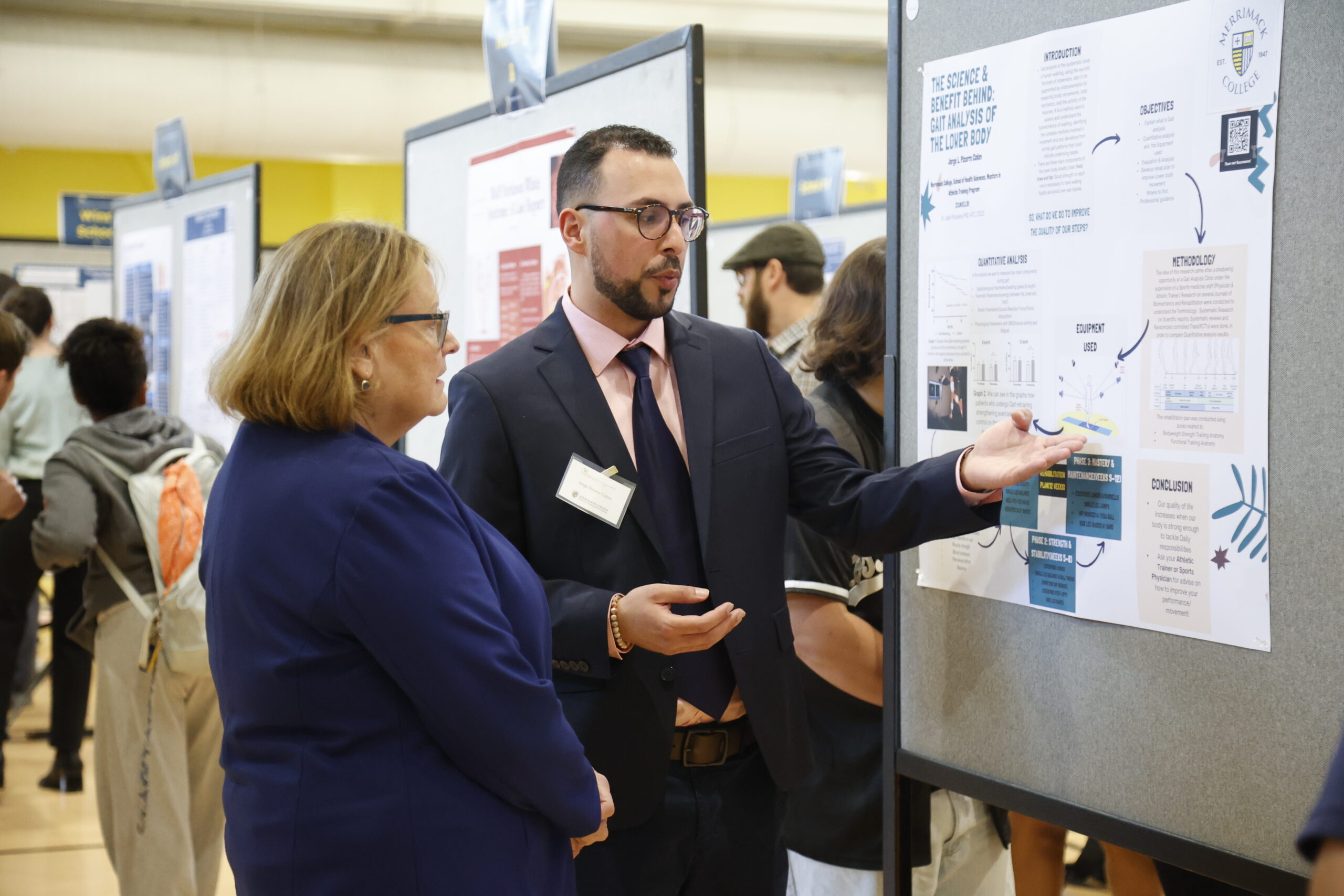Master of Science (M.S.) in Athletic Training
One of the top MSAT programs in New England! Earn your ATC credential through a CAATE-accredited, hands-on MSAT program with comprehensive clinical experience.
Gain clinical experience, prepare for Board of Certification (BOC) for the Athletic Training Certification and work with diverse clinical populations, elite facilities and expert faculty mentors.
Summer 2025 — Begin your first week ONLINE! Virtual classes begin May 12, and students will report to campus on May 19.
Apply by April 28, 2025 (March 31 for international applicants) to begin your MSAT this year!
Athletic Training Master's Degree at a Glance
Mode of Study
On Campus
Est. Time
24 Months Full-time (Part-time Study Available)
Start Terms
Summer I
View Application Deadlines
Credits
80 total (20 clinical, 60 classroom instruction)
Accreditation
Fellowships
No
Scholarships
Dean Scholarship &
Alumni Scholarship
Tell Me More About Merrimack's M.S. in Athletic Training
"*" indicates required fields
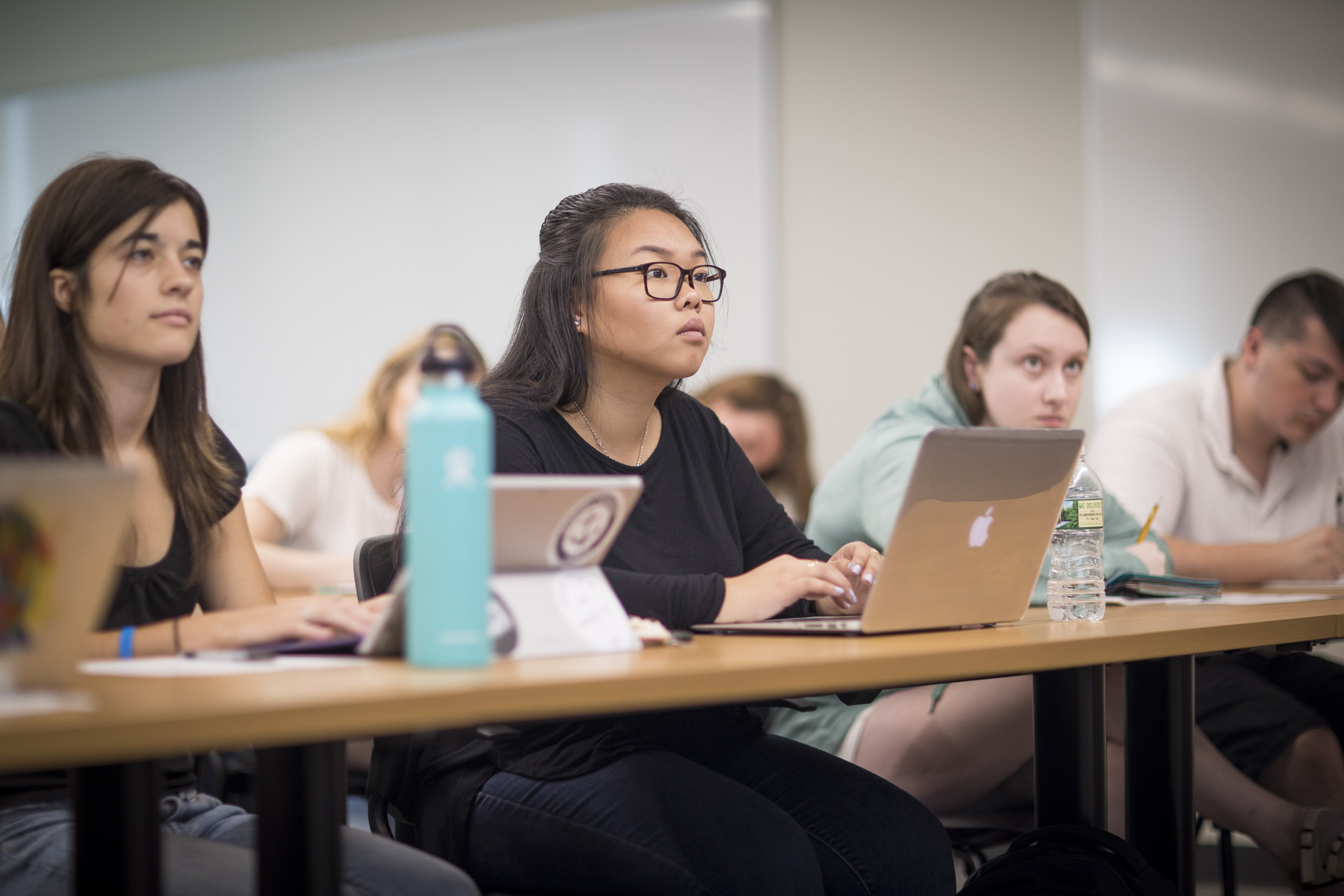
Graduate Programs Virtual Information Session
Wednesday, April 9, 2025
from 5:30 pm
to 6:30 pm
Learn about the Merrimack College community, application process, financial aid, your program's curriculum, professional opportunities, fellowships and more!
Master of Science in Athletic Training
Published Tuition
$860 per credit (80 credits). Tuition for 2024-2025. Rates are subject to change.
Average Aid Amount
Scholarships significantly reduce the tuition for most of our students.
Average Tuition Cost
After scholarships.
Typical Tuition Savings for the M.S. in Athletic Training
Merrimack College offers generous scholarship opportunities to offset your graduate tuition.
Double Warrior Alumni Scholarships are awarded to all Merrimack College alumni, covering $22,704, or 33% of tuition, for recent graduates (25% for previously graduated alumni).
Dean Scholarships are merit based aid awarded to all students, ranging from $7,000 to $18,000 and average $11,300 or 16% of tuition.
Visit the pages below to find all up-to-date information regarding tuition, fees, and additional program costs.
Overview of Merrimack's M.S. in Athletic Training
Merrimack offers 2 degree pathways to earning your MSAT:
Post-Baccalaureate Track
Our traditional, two-year post-baccalaureate program is for those with a bachelor’s degree. This option is ideal for those individuals who are looking to change their career or experienced allied health professionals who are looking to work with the active patient population. With this track, our graduates benefit from a rigorous curriculum and clinical education, preparing you to meet the specialized demands of a career in athletic training upon graduation.
Our post-baccalaureate track is also available to career changers with undergraduate degrees in unrelated fields, though these students will need to meet certain requirements to enter the program.
Accelerated (3+2) Track
With our accelerated track, students entering as freshman undergraduates can satisfy requirements for both the Bachelor of Science in Exercise Science and the MSAT after general education and pre-athletic training requirements—in just five years. You’ll complete three years of prerequisite courses (general education requirements) by the spring semester of your third year (94 credits), then advance directly into the master’s program where you’ll gain substantial clinical experience. Combining a liberal arts experience with professional education in athletic training, this track helps our graduates move quickly into the workplace with the competitive advantage of a master’s degree.
*Our 3+2 option can be available to students transferring into the concentration from other majors, though those students may need additional coursework to stay on track toward their degree.

Why Choose the M.S. in Athletic Training at Merrimack?
CAATE-ACCREDITED CURRICULUM
Merrimack’s MSAT program is accredited by the Commission on Accreditation of Athletic Training Education (CAATE), ensuring that students receive a high-quality education that meets professional standards. This accreditation prepares students for the Board of Certification exam and a successful career as a certified athletic trainer (ATC).
PERSONALIZED FACULTY MENTORSHIP
This program features small class sizes and dedicated faculty with diverse clinical expertise who provide individualized support and mentorship. Students build strong relationships with experienced clinical practitioners, gaining both academic instruction and career guidance from experts in the field.
EXTENSIVE HANDS-ON CLINICAL TRAINING
This program emphasizes practical learning through clinical training in diverse settings such as athletic programs, rehabilitation clinics, and hospitals. Students gain valuable experience in varied environments, including pediatric and collegiate sports, community health centers, military sites and more.
CUTTING-EDGE TECHNOLOGY AND FACILITIES
Our Athletic Training master’s program offers students access to state-of-the-art equipment, such as high-fidelity simulation manikins and advanced medical imaging tools. These resources enable students to practice and refine their skills in a modern, clinically relevant environment.
CAREER-READY GRADUATES
Graduates leave the program prepared to work in a range of settings, from sports teams and hospitals to rehabilitation facilities and performing arts. The combination of rigorous academic training, extensive clinical practice, and professional mentoring helps students stand out in a competitive job market.
Career Outlook: Where Can a M.S. in Athletic Training Take You?
Average Annual Salary
For an Athletic Trainer in Massachusetts
Employment Growth
Faster than average employment growth in the United States between 2022 and 2032.
Job openings
In Athletic Training as of 2023
Sources: Bureau of Labor Statistics (BLS) & Salary.com, 2025
Jobs with a Athletic Training Master's Degree
- Certified Athletic Trainer
- Director of Sports Medicine
- Injury Prevention Specialist
- Head Athletic Trainer for Professional Sports Teams
- Sports Program Administrator
- Rehabilitation Specialist
- Clinical Educator in Athletic Training
- Military Athletic Trainer
Where Merrimack's M.S. in Athletic Training Graduates Work
Employers seek out Merrimack’s MSAT graduates for their extensive clinical training, professionalism, and exceptional communication skills. Our alumni have been hired into prestigious positions at top organizations, including:
Boston College
Assistant Director, Sports Medicine
The Noble & Greenough School
Athletic Trainer
Curry College
Head Athletic Trainer
Mass General Brigham
Athletic Trainer
What Our M.S. in Athletic Training Students and Alumni Say
Read Student Spotlight

The Noble & Greenough School
Read Student Spotlight
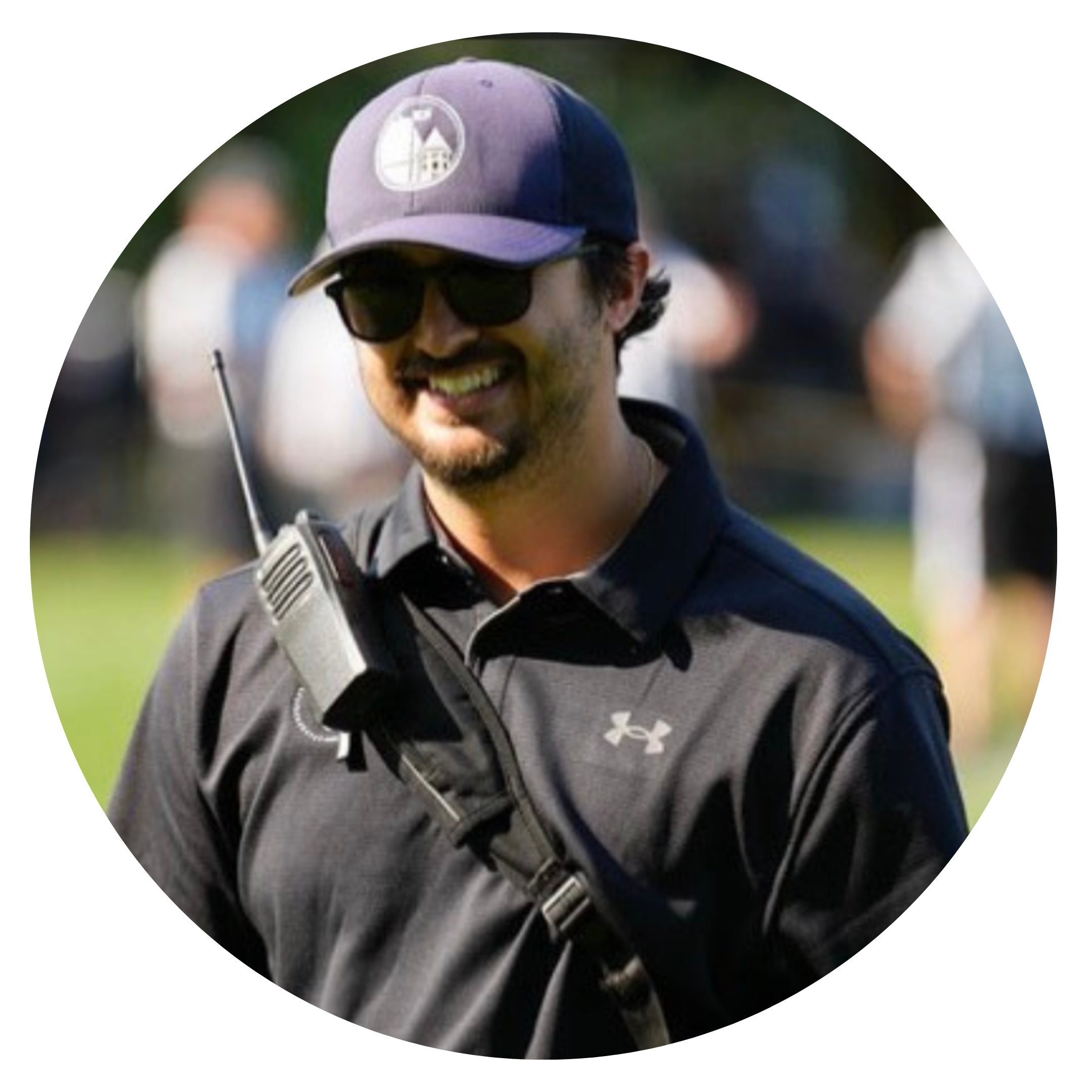
Naval Academy Preparatory School
Read Student Spotlight
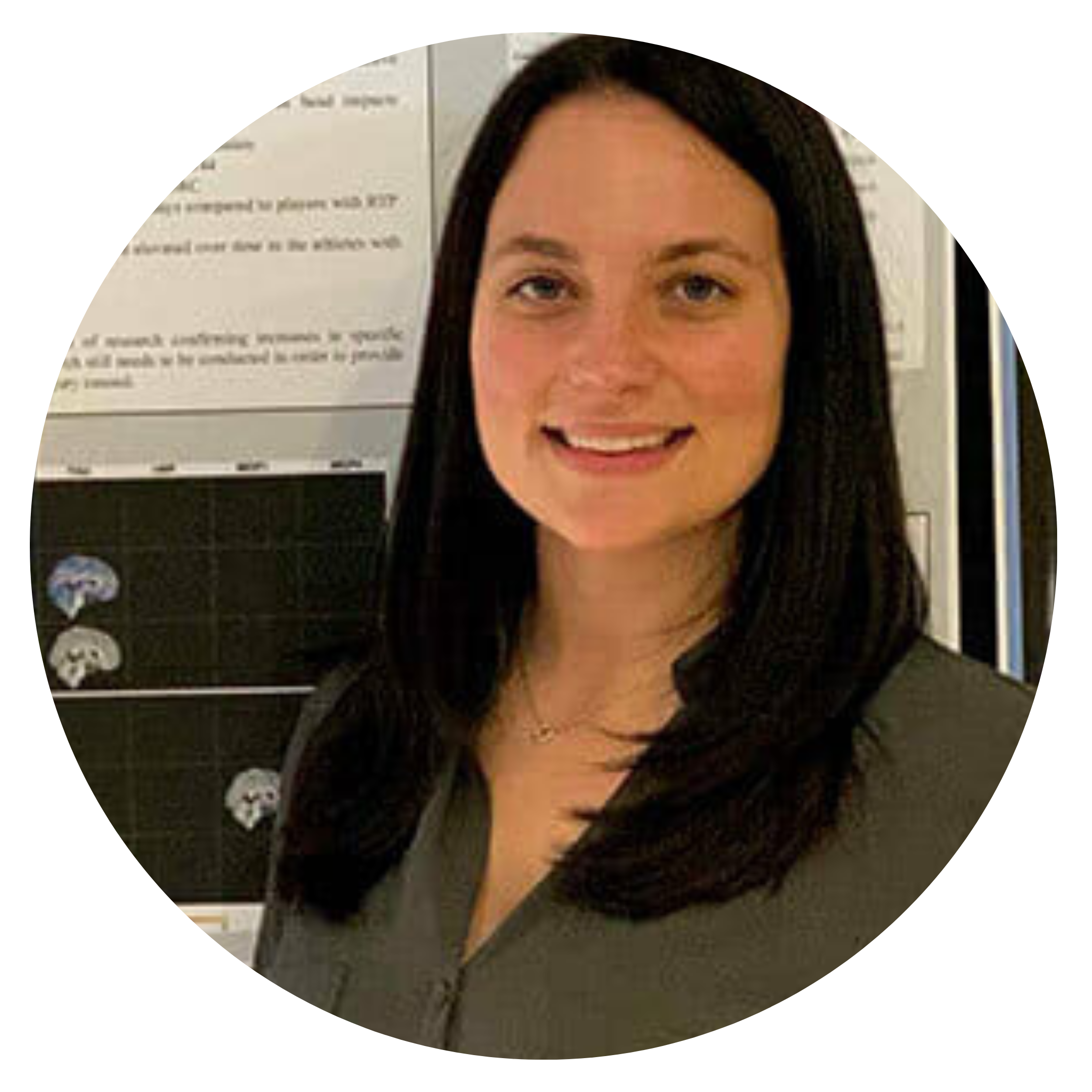
Rivier University
Listen to Student Podcast
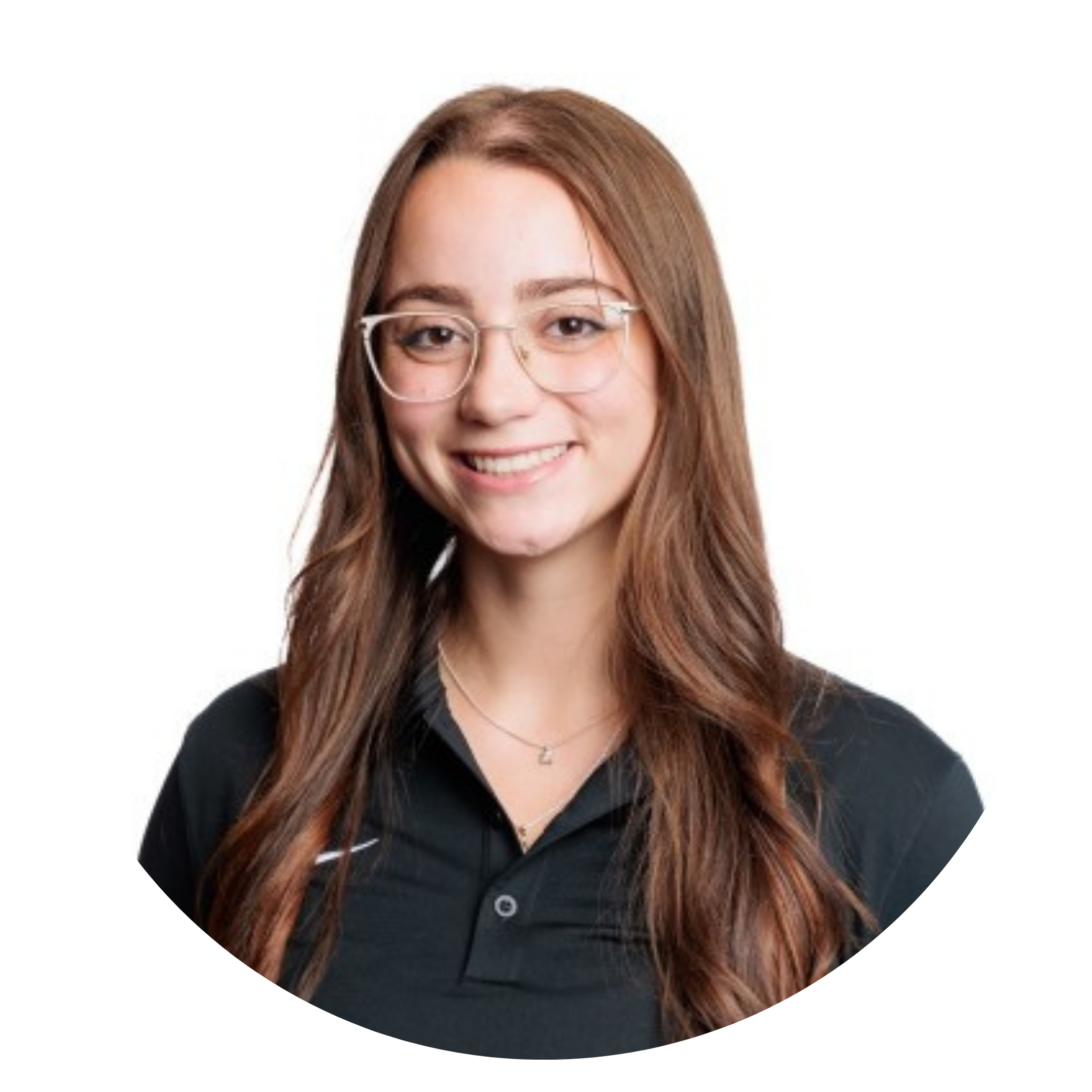
Beaver Country Day School, Inc.
Listen to student podcast

What You'll Learn in Merrimack's MSAT Program
MSAT Clinical Affiliations
Pediatric and High School Settings
- Andover High School, Andover, MA
- Billerica High School, Billerica, MA
- Brooks School, North Andover, MA
- Central Catholic High School, Lawrence, MA
- Derryfield School, Manchester, NH
- Essex Technical High School Danvers, MA
- Groton Dunstable Regional Academy, Groton, MA
- Haverhill High School, Haverhill, MA
- Lawrence Academy, Groton, MA
- Lexington High School, Lexington, MA
- Methuen High School, Methuen, MA
- Nobles & Greenough School, Dedham, MA
- Phillips Exeter Academy, Exeter, NH
- Pingree School Hamilton, MA
- Pinkerton Academy, Derry, NH
- Reading High School, Reading, MA
- Salem High School, Salem NH
College and University Affiliates
- Assumption University, Worcester, MA
- Boston College, Newton, MA
- Brown University, Providence, RI
- Bryant University, North Smithfield, RI
- College of the Holy Cross, Worcester, MA
- Curry College, Milton, MA
- Emerson College, Boston, MA
- Gallaudet University, Washington, DC
- Harvard University, Cambridge, MA
- Merrimack College, North Andover, MA
- Naval Academy, Annapolis, MD
- Northeastern University, Boston, MA
- Rivier University, Nashua, NH
- Saint Anselm’s College, Manchester, NH
- Salem State University, Salem, MA
- Stonehill College, Easton, MA
- Tufts University, Medford, MA
- UMASS Boston, MA
- UMASS Lowell, Lowell, MA
- University of Rhode Island, South Kingston, RI
- Villanova University, Villanova, PA
- WPI, Worcester, MA
Clinical Settings
- Excel Orthopedics, Woburn, MA
- Micheli Center at Children’s Hospital, Waltham, MA
- New England Baptist Hospital, Outpatient Center Dedham, MA
- Sports Rehab Unlimited, Middleton, MA
Professional Setting
- FC Dallas, Dallas, TX (Major League Soccer)
Key Courses You'll Take
Behavioral HealthCare
ATR 6750
- Explore the principles of integrated behavioral health care within primary care settings
- Develop foundational and advanced skills in patient engagement, assessment, intervention planning, treatment implementation, and program evaluation.
- Gain expertise in identifying mental health disorders, high-risk psychiatric presentations, and substance use issues while supporting diverse patients with complex health and behavioral needs.
Clinical Pathophysiology and Medical Interventions
ATR 6450
- Gain comprehensive knowledge in assessing and diagnosing musculoskeletal injuries of the lower extremity and low back.
- Focus on the integration and application of clinical outcome measures to guide injury evaluation and treatment decisions.
- Develop skills in evidence-based practice, ensuring that diagnostic and referral strategies are informed by the latest research and clinical guidelines.
Intro to Medical Imaging
ATR 6650
- Gain foundational knowledge of diagnostic imaging techniques used in the medical community.
- Understand the role of imaging in diagnosing and managing various medical conditions.
- Develop familiarity with commonly used imaging technologies through guided instruction.
M.S. in Athletic Training Curriculum
View Full Curriculum from the Graduate Catalog
M.S.A.T Requirements
To see more details about the program, please visit catalog.merrimack.edu.
Athletic Training, M.S.
Minimum number of credits required to graduate: 80
Minimum cumulative GPA required to graduate: 3.0
School: School of Nursing and Health Sciences
The Master of Science in Athletic Training (M.S.A.T.) program prepares candidates to meet the growing demand for athletic trainers in college, universities, youth leagues, rehabilitation clinics, and community and commercial settings. Degree candidates combine passion for healthcare with the rewards of assisting patients in recovering from injuries and medical conditions.
Two Year Post-Baccalaureate Program (80 credit hours)
Career Opportunities
As awareness of sports related injuries such as concussions continues to rise, the demand for these skills among qualified Athletic Trainers is projected to increase a full 21 percent for 2022-faster than the average of any other career [1]. At the same time, community-based health awareness efforts are enhancing parents' and coaches' understanding of the risks of youth injury, which should continue to fuel demand for onsite athletic trainers.
The rising population of active, injury prone older individuals, coupled with employers' concerns regarding on-the-job injuries and liability, are building demand in a wider range of settings than ever before, including:
- Physician offices, where athletic trainers serve in clinical roles complementing physicians
- Rural and urban hospitals, hospital emergency departments, and urgent and ambulatory care centers
- Clinics with specialties in sports medicine, cardiac rehabilitation, medical fitness, wellness, and physical therapy
- Occupational health departments in commercial settings including manufacturing, distribution, and offices
- Police and fire departments, municipal departments, and military bases
- Colleges, universities, and community-based youth sports leagues
- Performing arts, such as dancers, musicians, and acrobats
Admission Requirements
- A bachelor's degree from an accredited institution.
- Pre-requisite courses with a C+ or better in the following courses: Anatomy and Physiology I and II, Chemistry I, Biology with lab, Statistics, Nutrition, one semester of Physics, Introduction to Psychology. Additional coursework in either biomechanics/kinesiology and/or exercise physiology is recommended.
- Preferred GPA minimum 3.0.
Standardized test scores are optional. Merrimack College reserves the right to ask any applicant for additional supplemental requirements in consideration of their application, including, but not limited to, an in-person interview.
Program Requirements
Complete the following required courses:
- ATR 5100 - Functional Clinical Anatomy
- ATR 5150 - Emergency Management and Prevention
- ATR 5200 - Fundamental Skills in Athletic Training
- ATR 5300 - Clinical Decision Making I
- ATR 5301 - Clinical Decision Making II
- ATR 5400 - Clinical Examination and Diagnosis I
- ATR 5500 - Physical Agents and Mechanical Modalities
- ATR 6300 - Clinical Decision Making III
- ATR 6301 - Clinical Decision Making IV
- ATR 6302 - Clinical Decision Making V
- ATR 6350 - Cultural Competence in Health Care Administration
- ATR 6400 - Clinical Examination and Diagnosis II
- ATR 6450 - Clinical Pathophysiology and Medical Interventions
- ATR 6550 - Concepts in Therapeutic Interventions
- ATR 6600 - Research Methods in Clinical Practice
- ATR 6650 - Introduction to Medical Imaging
- ATR 6750 - Behavioral Healthcare
- ATRXXXX - Transition to Practices Credits: 4
- HSC 5320 - Foundations of Chronic Disease Prevention and Health Promotion
- HSC 6200 - Sports Nutrition
TECHNICAL STANDARDS
The Athletic Training Program at Merrimack College is a rigorous and intense program that places specific requirements and demands on the students enrolled in the program. An objective of this program is to prepare students to enter a variety of employment settings in athletic training and to render care to a wide spectrum of individuals engaged in physical activity. The technical standards set forth by the Athletic Training Program, establish the essential qualities considered necessary for students admitted to this program to achieve the knowledge, skills and competencies of an entry-level athletic trainer, as well as meet the expectations of the program's accrediting agency (Commission on Accreditation of Athletic Training Education (CAATE). The following abilities and expectations must be met by all students admitted to the Athletic Training Program. In the event a student is unable to fulfill these technical standards, with or without reasonable accommodation, the student will not be admitted into the program.
Compliance with the program's technical standards does not guarantee a student's eligibility for BOC certification exam.
Candidates for selection to the Athletic Training Program must demonstrate the following technical standards and guidelines with or without reasonable accommodations:
1. The ability to learn through observation. Observation requires the functional use of vision, hearing and somatic senses. The student must be able to participate in lectures, as well as laboratory and practicum demonstrations. The student should be able to:- Observe clinical signs through visual and tactile assessment (swelling, deformity), palpate a patient accurately to determine variations from the norm (through palpation of anatomical structures).
- Observe output readings to determine a patient's condition and status of treatment (blood pressure, range of motion, loss of function).
- Ability to listen to a patient describe their medical history and symptoms.
2. The student must possess the ability to communicate effectively and sensitively.
- With patients: to obtain information regarding the patients' health complaints and disposition.
- With colleagues and other members of the health care community: to convey essential information for safe and effective care.
- Students must be able to read, communicate in writing and demonstrate computer literacy assignments. The student must also be able to understand and speak the English language at a level consistent with competent professional practice.
3. The student must have sufficient neuromuscular control, sensory function and coordination to perform physical examinations using accepted methods. Accurately and safely utilize equipment and materials during the assessment and treatment of patients.
4. The student must possess the intellectual abilities to effectively solve problems and critically think. They must be able to measure, calculate, reason, analyze, integrate and synthesize information in a timely manner. (The student must be able to synthesize knowledge and integrate the relevant aspects of a patient's history and examination findings to develop an effective treatment plan).
5. Students must possess the psychological ability required for the full use of their intellectual abilities, for the exercise of good judgment, for the prompt completion of all responsibilities inherent to assessment and care of patients, and for the development of mature, sensitive and effective relationships with patients. Students should be able to tolerate physically and mentally taxing workloads and function effectively under stress. They must be able to adapt to a changing environment, and function in the face of uncertainties inherent in the setting of athletic training. Students must demonstrate ethical behavior, both in the classroom and during their clinical experience.
Reasonable Accommodations
A student must demonstrate the above skills and abilities, but may do so with or without reasonable accommodation. The Athletic Training Program Director in combination with the Director of Accessibility Services will provide reasonable accommodations to qualified students to enable them to meet these technical guidelines. Whether or not an accommodation is reasonable will be determined on an individual basis.Students seeking academic accommodations must provide medical documentation of their disability and comply with the procedures of the Merrimack College Office of Accessibility Services. Once a student's eligibility is established the Director of Accessibility Services will forward a set of recommended accommodations to each of the student's professors who reviews these recommendations to ensure that the accommodations requested are reasonable, taking into account whether the accommodation would jeopardize clinician/patient safety, or the educational process of the student or the institution, including all coursework, clinical experiences and internships deemed essential to graduation.
A student who is admitted to the major but unable to fulfill these technical standards, with or without reasonable accommodation, will not be able to complete the major.
Clinical Education Plan
The clinical education plan maps the athletic training student’s clinical rotation experiences to the academic component of their education.
Skills You'll Learn
Merrimack’s two-year, full-time athletic training master’s program equips you with a complete set of applied skills and full preparation for the Board of Certification exam to earn athletic trainer certification (ATC).
The athletic training master’s program consists of 20 credits of clinical practice, plus 60 credits of classroom instruction in areas such as:
Functional clinical anatomy
Evidence based clinical decision making
Clinical Pathology and Medical Intervention
Clinical examination and diagnosis
Acute and emergent care
Therapeutic interventions
Clinical mental health strategies
Medical imaging
Health care administration
Research Methods in Clinical Practice
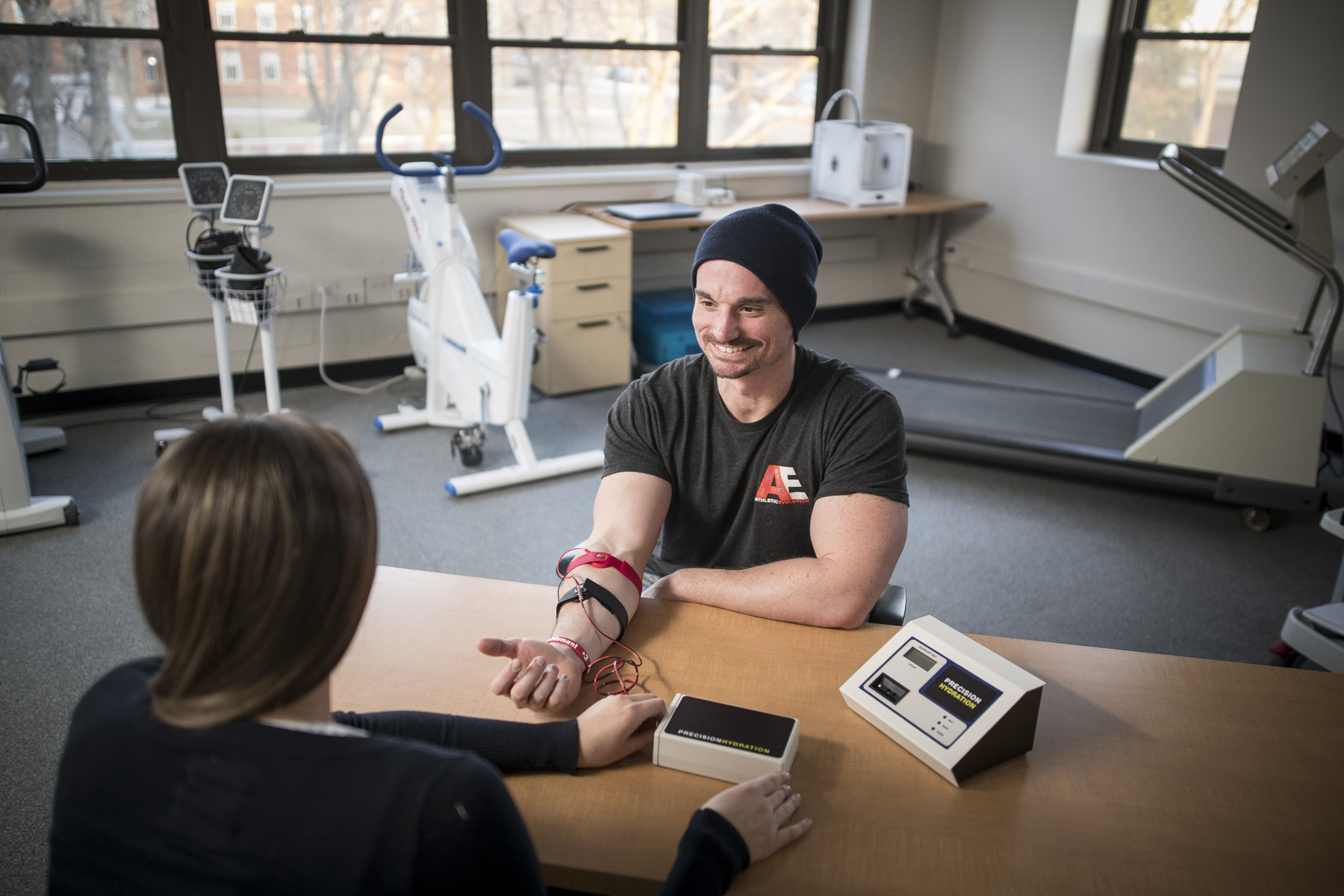
Featured Faculty
Birgid Hopkins, M.S.
Chair, Exercise and Rehabilitation Sciences & Associate Clinical Professor, Exercise and Rehabilitation Sciences; Director, Athletic Training
Birgid Hopkins, Chair and Associate Clinical Professor of Exercise and Rehabilitation Sciences at Merrimack College, holds an M.S. in Exercise Physiology from Florida International University. A certified athletic trainer, she directs the Athletic Training program, teaches, advises students, and contributes to national exam development with the Board of Certification for Athletic Trainers.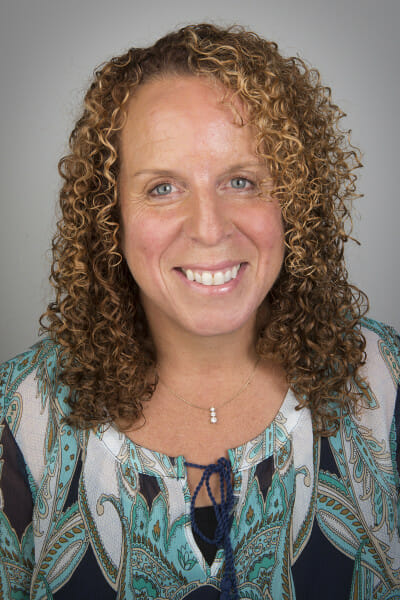
Leah Poloskey, Ph.D.
Associate Clinical Professor
Dr. Leah Poloskey, Associate Clinical Professor at Merrimack College, holds a Ph.D. in Teaching and Administration from Springfield College. An expert in athletic training and mental health, she researches behavioral health, physical activity, and athletic training education, earning the NATA Emerging Educator Award in 2020.
Scott Braid, Ph.D.
Associate Clinical Professor
Dr. Scott Braid, Assistant Clinical Professor at Merrimack College, holds a Doctorate in Athletic Training from Temple University. Specializing in concussion-related lower extremity injuries in collegiate athletes, he teaches courses on emergency care, therapeutic modalities, mental health, and diversity in healthcare.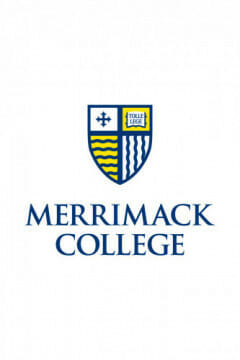
Scholarships and Financial Aid
Merrimack College offers generous scholarships for MSAT students:
- Dean Scholarship: Determined by academic merit and financial need. All prospective students are automatically considered for a Dean Scholarship upon applying.
- Double Warrior Alumni Scholarship: Available to all Merrimack graduates. Students enrolling immediately after senior undergraduate year automatically receive a 33% discount, and 25% thereafter. Please note that Double Warrior alumni scholarships cannot be combined with Dean Scholarships.
Financial aid in the form of federal aid, private loans, and payment plans are also options available for graduate students. Click the link below to learn more about our scholarships and financial aid opportunities.
Application Information for the M.S. in Athletic Training
It’s easy to apply online! Simply create your account by registering a username and password. This will allow you to start an application, save and log back in at any time to complete it before submission.
A Completed Application Includes:
Important Information:
- Online application
- Official college transcripts from all institutions attended
- Resumé
- Interview OR personal statement
- Contact information for one reference OR one letter of recommendation
- No application fee
- No GRE requirement
- Optional: Submit test scores to enhance or support your academic background.
Graduate Community and Student Support
Discover Merrimack’s vibrant and supportive graduate community! Our Graduate Center, located on the second floor of the McQuade Library, is our hub for student life, resources, and support, ensuring that you get the most out of your graduate experience.
Enjoy the following benefits that are exclusive to graduate students:
A comfortable lounge for studying and socializing
A home base for daily life on campus with coffee and tea, a microwave and a fridge
A venue for programs and services supporting graduate student success
A warm, inviting place to connect with staff and other graduate students
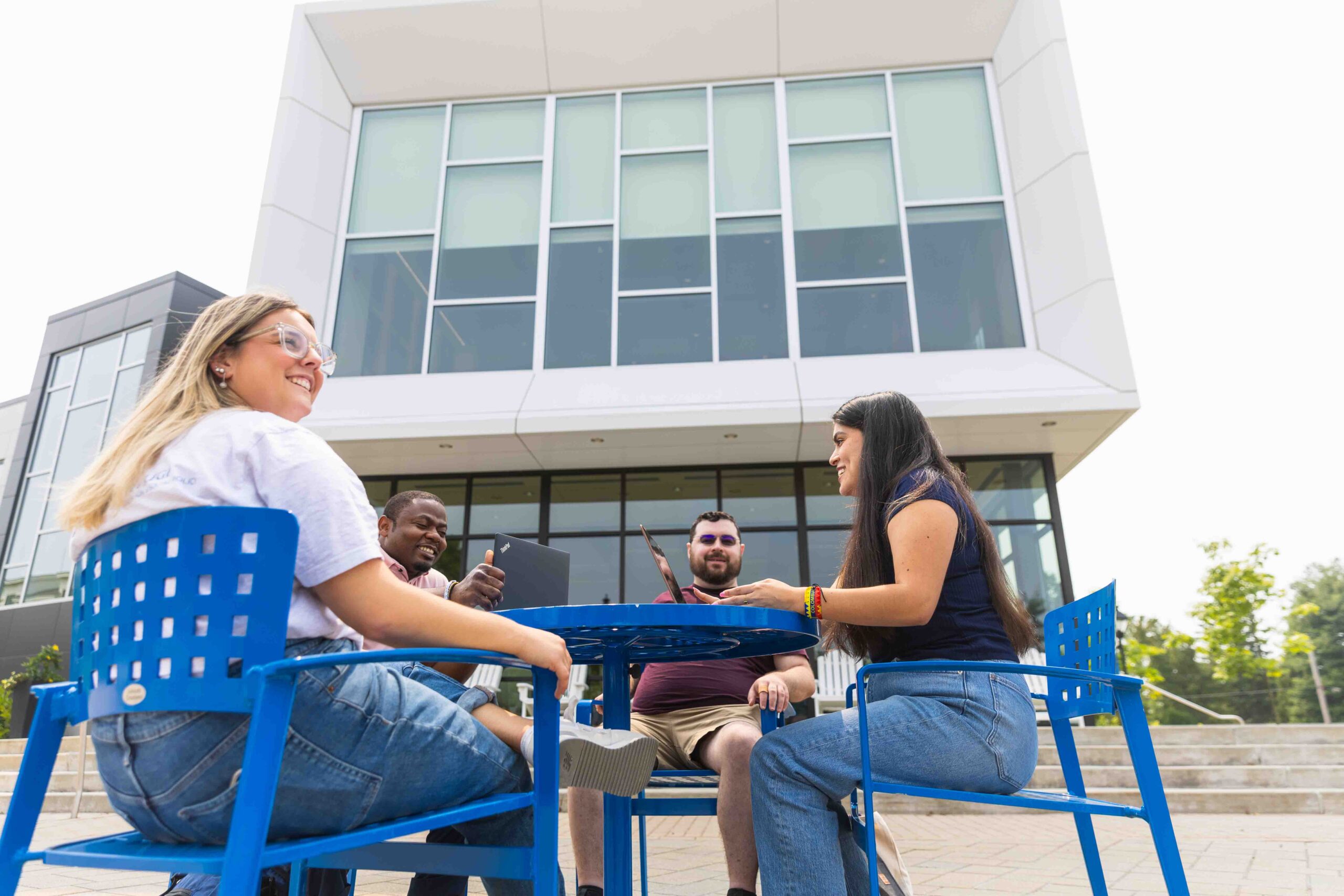
Commission on Accreditation of Athletic Training Education (CAATE) Accreditation
Merrimack College is currently accredited by the Commission on Accreditation of Athletic Training Education (CAATE),
2001 K Street NW, Third Floor North, Washington, DC 20006.
Learn more about our program’s BOC pass rate, program retention rate, program graduation rate and graduate placement rate.

Want to Learn More about the M.S. in Athletic Training?
Contact the Program Director, Birgid Hopkins.
Take the Next Step (We're Here to Help)
At Merrimack, we are ready to meet you where you are and get you where you want to go. And, we make the process simple along the way! Please feel free to contact our Graduate Admission team or join us at an upcoming event if you have any questions regarding scholarships, financial aid, or the application process.
Programs Related to the M.S. in Athletic Training
Explore other areas and where they can take you.
Grad Chat Podcast
- Check out this episode of Grad Chat featuring Caitlin Victor from the Master of Science in Athletic Training program. Caitlin shares her reasons for choosing Merrimack College, highlighting the high percentage of students who pass the BOC exam on their first try, the strong job placement rate for graduates, and the extensive list of available clinical sites. She also discusses why this program holds a special place in her heart. Interested in learning more about Merrimack’s Athletic Training program? Don’t miss this episode!
Check us out on social media!
What's New at Merrimack
Merrimack College Awards & Recognition
U.S. News & World Report | Best Regional Universities North (2024)
- Most Innovative Schools (#5)
- Regional Universities North (#39)
- Best Undergraduate Teaching (#19)
- Best Colleges for Veterans (#15)
- Best Value Schools (#51)
